外研版必修五Module 2 A Job Worth Doing 语法课件(共22页ppt)
文档属性
| 名称 | 外研版必修五Module 2 A Job Worth Doing 语法课件(共22页ppt) |
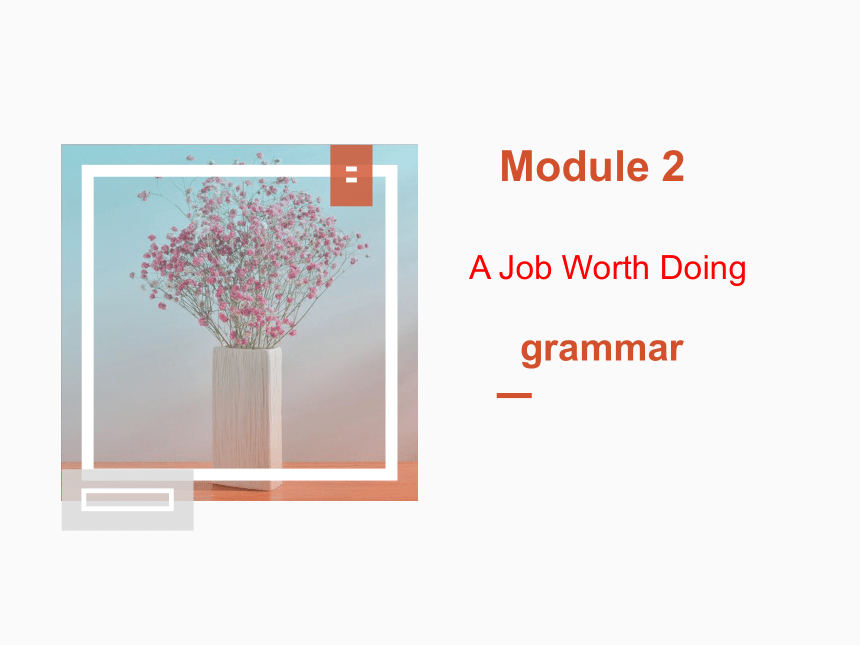
|
|
| 格式 | zip | ||
| 文件大小 | 4.7MB | ||
| 资源类型 | 教案 | ||
| 版本资源 | 外研版 | ||
| 科目 | 英语 | ||
| 更新时间 | 2020-07-21 00:00:00 | ||
图片预览


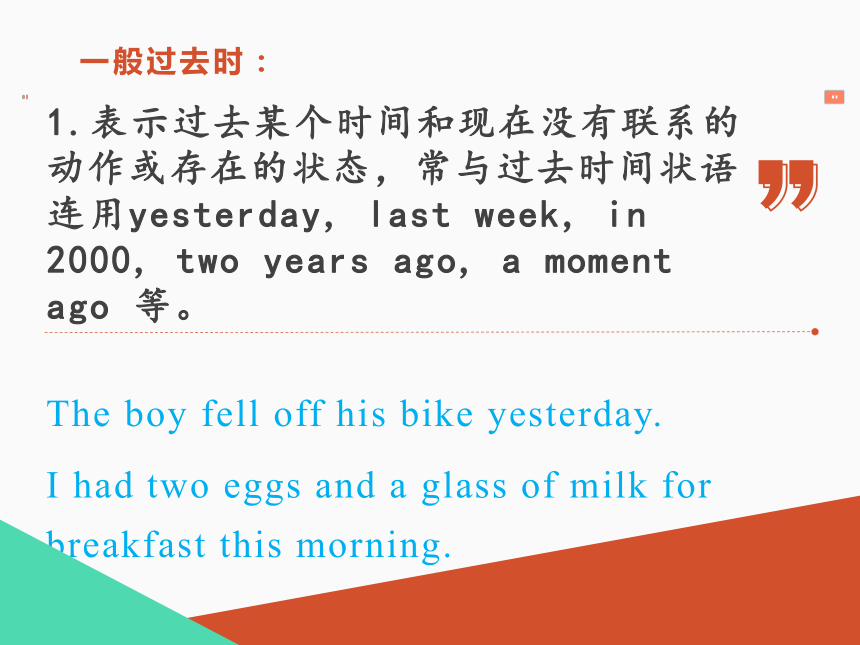
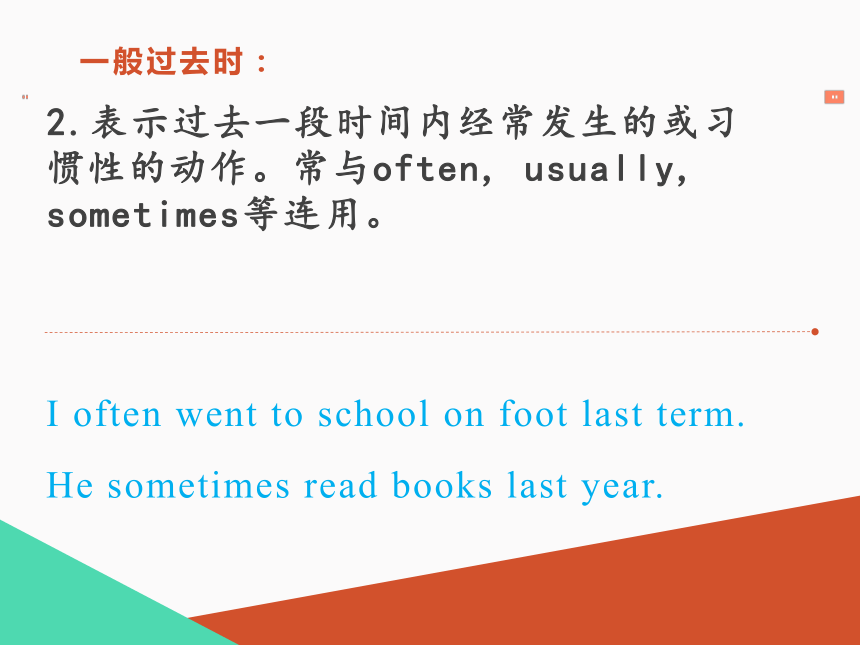
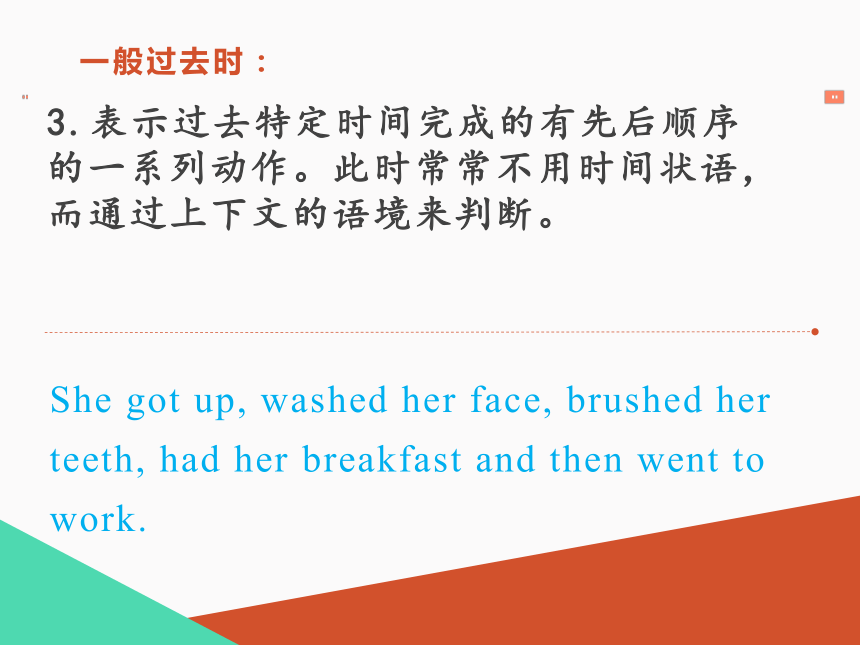

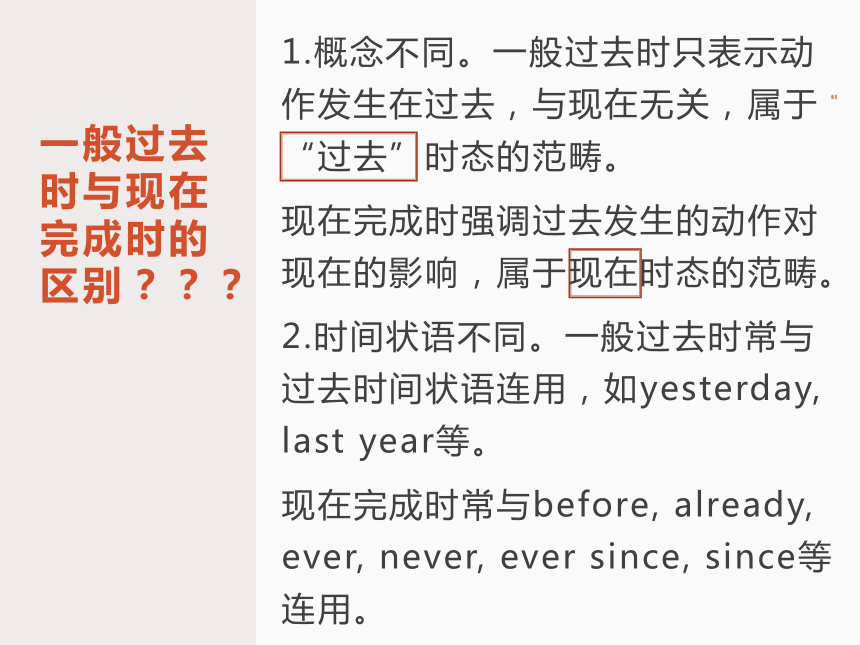
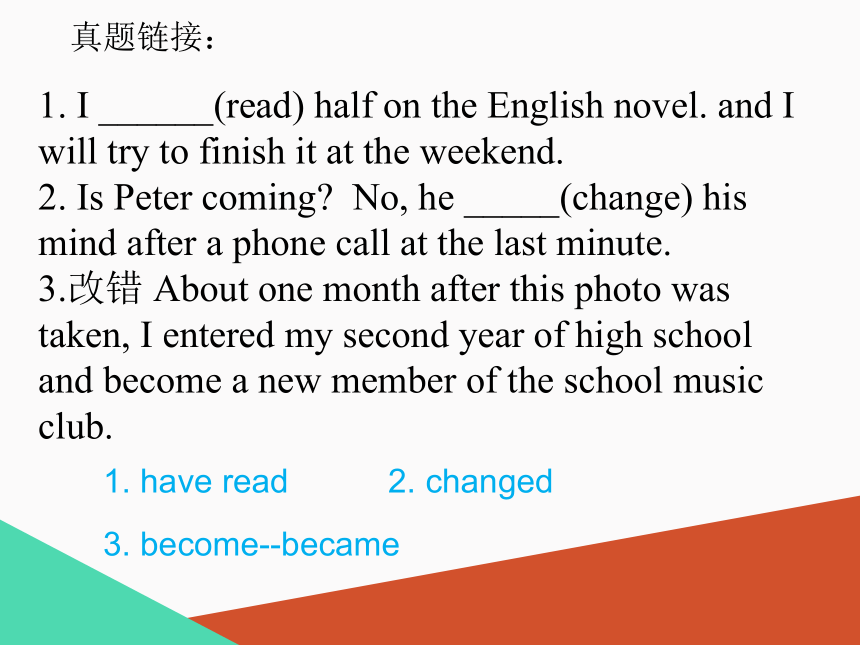

文档简介
(共22张PPT)
grammar
Module
2
A
Job
Worth
Doing
一、一般过去式
一般过去时:
1.表示过去某个时间和现在没有联系的动作或存在的状态,常与过去时间状语连用yesterday,
last
week,
in
2000,
two
years
ago,
a
moment
ago
等。
The
boy
fell
off
his
bike
yesterday.
I
had
two
eggs
and
a
glass
of
milk
for
breakfast
this
morning.
一般过去时:
2.表示过去一段时间内经常发生的或习惯性的动作。常与often,
usually,
sometimes等连用。
I
often
went
to
school
on
foot
last
term.
He
sometimes
read
books
last
year.
一般过去时:
3.表示过去特定时间完成的有先后顺序的一系列动作。此时常常不用时间状语,而通过上下文的语境来判断。
She
got
up,
washed
her
face,
brushed
her
teeth,
had
her
breakfast
and
then
went
to
work.
一般过去时:
4.在表示时间或条件等状语从句中代替过去将来时。
She
said
she
would
come
if
I
promised
to
wait
for
her.
He
said
he
would
tell
her
about
the
news
as
soon
as
he
met
her.
一般过去时与现在完成时的区别???
1.概念不同。一般过去时只表示动作发生在过去,与现在无关,属于“过去”时态的范畴。
现在完成时强调过去发生的动作对现在的影响,属于现在时态的范畴。
2.时间状语不同。一般过去时常与过去时间状语连用,如yesterday,
last
year等。
现在完成时常与before,
already,
ever,
never,
ever
since,
since等连用。
1.
I
______(read)
half
on
the
English
novel.
and
I
will
try
to
finish
it
at
the
weekend.
2.
Is
Peter
coming?
No,
he
_____(change)
his
mind
after
a
phone
call
at
the
last
minute.
3.改错
About
one
month
after
this
photo
was
taken,
I
entered
my
second
year
of
high
school
and
become
a
new
member
of
the
school
music
club.
真题链接:
3.
become--became
2.
changed
1.
have
read
一、过去完成时
1.表示过去某一时间或某一动作之前已经完成的动作。这个动词的时间常用by,
before等引导的介词短语或一个时间状语从句表示,也可通过一个表示过去的动词或上下文来表示
I
had
finished
my
homework
before
supper.
The
play
had
already
started
when
we
got
to
the
theatre.
By
the
end
of
June
they
had
treated
over
10,000
patients.
2.表示从过去某一时刻开始,一直持续到过去另一时刻的动作或状态,常和for,
since构成的时间状语连用。
I
had
been
at
the
bus
stop
for
30
minutes
when
a
bus
finally
came.
She
said
she
had
made
great
progress
since
she
came
here.
3.在含有定语从句的主从复合句中,如果主从复合句叙述的是过去的事,则先发生的动作常用过去完成时。
She
returned
the
book
that
she
had
borrowed.
He
found
the
key
that
she
had
lost.
4.在含有时间、条件、原因等状语从句的复合句中,若从句动作的发生有先后顺序,动作在前的要用过去完成时,动作在后的用一般过去时。
She
felt
tired
because
she
had
worked
a
whole
day.
I
found
the
lecture
hard
to
follow
because
it
had
started
when
I
arrive.
5.want,hope,
mean,plan,
intend等动词的过去完成时可以用来表示本来打算做而没有做的事,也可表示过去未曾实现的想法等,含有惋惜之意。
We
had
meant
to
tell
her
the
news
but
found
that
she
wasn't
in.
I
had
intended
to
call
on
you
yesterday,
but
someone
came
to
see
me
just
now
when
I
was
about
to
leave.
6.过去完成时用于某些固定句型:
(1).
hardly\scarely...when...,
no
sooner..than..句型中,主句用过去完成时,从句用一般过去时。当hardly,scarely,no
sooner放句首时,句子用部分倒装。
I
had
hardly
got
to
the
office
when
my
wife
phoned
me
to
go
back
home
at
once.
Hardly
had
I
got
to
the
office.....
(2)
It
was+段时间+since(过完)
(3)
It
was
the
first\second..time+that(过完)
(4)主句(过完)+by
the
time+句子(一般过去时)
(5)句子(过完)+by
the
end
of+表示过去的时间
It
was
three
months
since
I
had
left
Beijing.
It
was
the
first
time
that
he
had
taken
a
plane.
By
the
time
I
saw
the
angry
expression
on
his
face,
I
had
known
what
I
had
to
face.
By
the
end
of
last
year,
another
new
theme
park
had
between
completed
.
三、过去进行时
I
was
watching
TV
at
eight
last
night.
He
was
learning
English
at
9
yesterday
evenig.
1.过去进行时表示过去某一时刻或某一时间段内正在进行或发生的动作,动作发生的特定时间常用一个短语或时间状语从句来表示。
She
was
reading
an
English
magazine
when
I
came
in.
2.在含有时间状语从句的复合句中,延续性动作用过去进行时,短暂性动作用一般过去时。
They
wanted
to
know
when
we
were
leaving
for
Shanghai.
3.某些非延续性动词go,come,leave等,可用过去惊醒时代替过去将来时。
The
Greens
were
always
helping
others
when
they
lived
here.
4.过去进行时与always,
constantly,frequently等词连用,表示说话人的情绪。
感谢观看
有人说:人生至少要有两次冲动,一场奋不顾生的爱情和一段说走就走的旅行
grammar
Module
2
A
Job
Worth
Doing
一、一般过去式
一般过去时:
1.表示过去某个时间和现在没有联系的动作或存在的状态,常与过去时间状语连用yesterday,
last
week,
in
2000,
two
years
ago,
a
moment
ago
等。
The
boy
fell
off
his
bike
yesterday.
I
had
two
eggs
and
a
glass
of
milk
for
breakfast
this
morning.
一般过去时:
2.表示过去一段时间内经常发生的或习惯性的动作。常与often,
usually,
sometimes等连用。
I
often
went
to
school
on
foot
last
term.
He
sometimes
read
books
last
year.
一般过去时:
3.表示过去特定时间完成的有先后顺序的一系列动作。此时常常不用时间状语,而通过上下文的语境来判断。
She
got
up,
washed
her
face,
brushed
her
teeth,
had
her
breakfast
and
then
went
to
work.
一般过去时:
4.在表示时间或条件等状语从句中代替过去将来时。
She
said
she
would
come
if
I
promised
to
wait
for
her.
He
said
he
would
tell
her
about
the
news
as
soon
as
he
met
her.
一般过去时与现在完成时的区别???
1.概念不同。一般过去时只表示动作发生在过去,与现在无关,属于“过去”时态的范畴。
现在完成时强调过去发生的动作对现在的影响,属于现在时态的范畴。
2.时间状语不同。一般过去时常与过去时间状语连用,如yesterday,
last
year等。
现在完成时常与before,
already,
ever,
never,
ever
since,
since等连用。
1.
I
______(read)
half
on
the
English
novel.
and
I
will
try
to
finish
it
at
the
weekend.
2.
Is
Peter
coming?
No,
he
_____(change)
his
mind
after
a
phone
call
at
the
last
minute.
3.改错
About
one
month
after
this
photo
was
taken,
I
entered
my
second
year
of
high
school
and
become
a
new
member
of
the
school
music
club.
真题链接:
3.
become--became
2.
changed
1.
have
read
一、过去完成时
1.表示过去某一时间或某一动作之前已经完成的动作。这个动词的时间常用by,
before等引导的介词短语或一个时间状语从句表示,也可通过一个表示过去的动词或上下文来表示
I
had
finished
my
homework
before
supper.
The
play
had
already
started
when
we
got
to
the
theatre.
By
the
end
of
June
they
had
treated
over
10,000
patients.
2.表示从过去某一时刻开始,一直持续到过去另一时刻的动作或状态,常和for,
since构成的时间状语连用。
I
had
been
at
the
bus
stop
for
30
minutes
when
a
bus
finally
came.
She
said
she
had
made
great
progress
since
she
came
here.
3.在含有定语从句的主从复合句中,如果主从复合句叙述的是过去的事,则先发生的动作常用过去完成时。
She
returned
the
book
that
she
had
borrowed.
He
found
the
key
that
she
had
lost.
4.在含有时间、条件、原因等状语从句的复合句中,若从句动作的发生有先后顺序,动作在前的要用过去完成时,动作在后的用一般过去时。
She
felt
tired
because
she
had
worked
a
whole
day.
I
found
the
lecture
hard
to
follow
because
it
had
started
when
I
arrive.
5.want,hope,
mean,plan,
intend等动词的过去完成时可以用来表示本来打算做而没有做的事,也可表示过去未曾实现的想法等,含有惋惜之意。
We
had
meant
to
tell
her
the
news
but
found
that
she
wasn't
in.
I
had
intended
to
call
on
you
yesterday,
but
someone
came
to
see
me
just
now
when
I
was
about
to
leave.
6.过去完成时用于某些固定句型:
(1).
hardly\scarely...when...,
no
sooner..than..句型中,主句用过去完成时,从句用一般过去时。当hardly,scarely,no
sooner放句首时,句子用部分倒装。
I
had
hardly
got
to
the
office
when
my
wife
phoned
me
to
go
back
home
at
once.
Hardly
had
I
got
to
the
office.....
(2)
It
was+段时间+since(过完)
(3)
It
was
the
first\second..time+that(过完)
(4)主句(过完)+by
the
time+句子(一般过去时)
(5)句子(过完)+by
the
end
of+表示过去的时间
It
was
three
months
since
I
had
left
Beijing.
It
was
the
first
time
that
he
had
taken
a
plane.
By
the
time
I
saw
the
angry
expression
on
his
face,
I
had
known
what
I
had
to
face.
By
the
end
of
last
year,
another
new
theme
park
had
between
completed
.
三、过去进行时
I
was
watching
TV
at
eight
last
night.
He
was
learning
English
at
9
yesterday
evenig.
1.过去进行时表示过去某一时刻或某一时间段内正在进行或发生的动作,动作发生的特定时间常用一个短语或时间状语从句来表示。
She
was
reading
an
English
magazine
when
I
came
in.
2.在含有时间状语从句的复合句中,延续性动作用过去进行时,短暂性动作用一般过去时。
They
wanted
to
know
when
we
were
leaving
for
Shanghai.
3.某些非延续性动词go,come,leave等,可用过去惊醒时代替过去将来时。
The
Greens
were
always
helping
others
when
they
lived
here.
4.过去进行时与always,
constantly,frequently等词连用,表示说话人的情绪。
感谢观看
有人说:人生至少要有两次冲动,一场奋不顾生的爱情和一段说走就走的旅行
